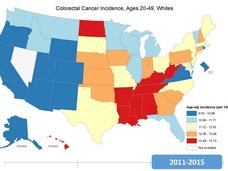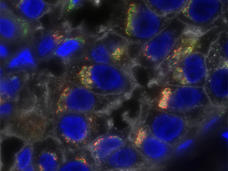Cancer Currents: An NCI Cancer Research Blog
A blog featuring news and research updates from the National Cancer Institute.
-
The Childhood Cancer Data Initiative: Why Data Sharing Is Essential to Progress
NCI is laying the groundwork to develop the Childhood Cancer Data Initiative (CCDI). NCI Acting Director Douglas Lowy, M.D., explains why an initiative with a focus on data sharing is essential to accelerating progress against childhood cancer.
-
Drug Shows Promise in Slowing Progression of Smoldering Myeloma to Cancer
The drug lenalidomide (Revlimid) may delay the progression of smoldering myeloma to multiple myeloma, according to preliminary results from a clinical trial.
-
Studying Genes and Proteins Together Sheds New Light on Colon Cancer
Using novel proteogenomic techniques, scientists from NCI’s Clinical Proteomic Tumor Analysis Consortium have uncovered new features of colon cancer that may guide new treatment strategies.
-
T-DM1 Approval Expanded to Include Some Women with Early-Stage HER2-Positive Breast Cancer
FDA has expanded the approved use of the drug ado-trastuzumab emtansine (Kadcyla), also called T-DM1, to include adjuvant treatment in some women with early-stage HER2-positive breast cancer.
-
When Cancer Spreads to Bone, A Single Dose of Radiation Therapy May Control Pain
New findings from a clinical trial suggest that a single dose of radiation therapy may control painful bone metastases as effectively as multiple lower doses of radiation therapy.
-
Pediatric MATCH Study Finds More Targetable Genetic Changes than Expected
An early report from the NCI–COG Pediatric MATCH trial shows that 24% of young patients with advanced cancer who had their tumors tested for genetic changes were eligible to receive one of the targeted therapies being tested.
-
Tagraxofusp Proves Effective for BPDCN, A Rare Blood Cancer
New findings from a clinical trial of the drug tagraxofusp confirm its efficacy against the rare blood cancer blastic plasmacytoid dendritic cell neoplasm (BPDCN).
-
Prostate Cancer Prevention and Finasteride: A Conversation with NCI’s Dr. Howard Parnes
The Prostate Cancer Prevention Trial showed that finasteride can reduce the risk of prostate cancer, but might increase the risk of aggressive disease. NCI’s Howard Parnes talks about subsequent findings and what they mean for men aged 55 and older.
-
New Drugs, New Side Effects: Complications of Cancer Immunotherapy
The expanding use of cancer immunotherapy has revealed a variety of side effects associated with this treatment approach. Researchers are now trying to better understand how and why these side effects occur and develop strategies for better managing them.
-
Some Children with Liver Cancer May Need Less Chemotherapy, Study Suggests
Some children with liver cancer may need less chemotherapy than is typically used, new research suggests. The study included children and infants with hepatoblastoma whose tumors had been surgically removed when the disease was diagnosed.
-
A Vaccine to Treat Non-Hodgkin Lymphoma Advancing in Clinical Trials
In some people with non-Hodgkin lymphoma (NHL), treating a single tumor with an in situ vaccine can help to shrink, or eliminate, tumors in other parts of the body, findings from a small clinical trial suggest.
-
Telephone-Based Rehab Program Helps People with Advanced Cancer Maintain Independence
A physical rehabilitation program delivered by telephone improved function and reduced pain for people with advanced cancer, a clinical trial shows. The program also reduced the time patients spent in hospitals and long-term care facilities.
-
Immunotherapy Drug with Two Targets Shows Promise against HPV-Related Cancers
The investigational immunotherapy drug bintrafusp alfa (also called M7824), a bifunctional fusion protein, shrank the tumors of some patients with advanced HPV-related cancers, according to results from a phase 1 clinical trial.
-
Study Advances Fertility Preservation Approach for Male Cancer Survivors
In a study in young monkeys, researchers showed that a technique using stored testicular tissue led to successful conception. Researchers are hopeful the approach could eventually be a fertility preservation option for young boys being treated for cancer.
-
Could a Vaccine Prevent Colorectal Cancer in People with Lynch Syndrome?
Findings from an NCI-funded study suggest a new vaccine approach may have the potential to prevent colorectal cancer in people with Lynch syndrome, an inherited condition that increases an individual's risk for developing certain types of cancer.
-
Ensuring a Smooth Leadership Transition at NCI
Doug Lowy, M.D., a long-time researcher and deputy director at NCI, addresses the cancer community as the institute's acting director, a position he previously held for more than 2 years.
-
Fewer Women with Ovarian, Breast Cancer Undergo Genetic Testing than Expected
Many women diagnosed with ovarian and breast cancer are not undergoing tests for inherited genetic mutations that can provide important information to help guide decisions about treatment and longer-term cancer screening, a new study has found.
-
Researchers Discover Potential Way to Hit Elusive Target in Pancreatic Cancer
Three research groups have found a potential way to kill cancer cells in pancreatic tumors by simultaneously blocking the activity of proteins that interact with KRAS proteins and disrupting an energy-creating process called autophagy.
-
New on NCI's Websites for March 2019
NCI periodically provides updates on new websites and other online content of interest to the cancer community. See selected content that has been added as of March 2019.
-
Atezolizumab Approved for Some Patients with Triple-Negative Breast Cancer
FDA has approved atezolizumab (Tecentriq) in combination with chemotherapy for the treatment of some women with advanced triple-negative breast cancer. This is the first FDA-approved regimen for breast cancer to include immunotherapy.




















